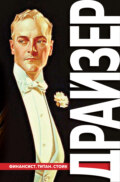
Теодор Драйзер
Финансист / The Financier
Chapter VII
In the meantime, his interest in Mrs. Semple had been secretly and strangely growing. When he received an invitation to call at the Semple home, he accepted with a great deal of pleasure. Their house was located not so very far from his own, on North Front Street.
It could not be said that Lillian had wildly loved Mr. Semple at any time. Although she had cheerfully married him, he was not the kind of man who could arouse a notable passion in any woman. He was practical, methodic, orderly. His shoe store was a good one. He loved to talk, when he talked at all, of shoe manufacturing, the development of styles.
Cowperwood could not keep his eyes off her. She was aware of this but she did not attach any significance to it.
At first, when Frank came, she did not have much to say. She was gracious, but the burden of conversation fell on her husband. Cowperwood watched the varying expression of her face from time to time. Mr. Semple talked to him pleasantly, because in the first place Frank was becoming financially significant, was suave and ingratiating, and Frank represented progress to him. One spring evening they sat on the porch and talked—nothing very important—slavery, street-cars, the panic—it was on then, that of 1857—the development of the West. Mr. Semple wanted to know all about the stock exchange. In return Frank asked about the shoe business, though he really did not care. All the while he watched Mrs. Semple. Her manner, he thought, was soothing, attractive, delightful. She served tea and cake for them. They went inside after a time to avoid the mosquitoes. She played the piano. At ten o'clock he left.
Thereafter, for a year or so, Cowperwood bought his shoes of Mr. Semple. About a year later, Mr. Semple died. It was an untimely death. He was seized with a cold in the chest late in the autumn—and had insisted on going to business when Mrs. Semple urged him to stay at home and recuperate. Then nine more days of pneumonia—and he was dead. The shoe store was closed for a few days; the house was full of sympathetic friends and church people. There was a funeral with burial service in the church, and then he was buried. Mrs. Semple cried bitterly.
The shock of death affected her greatly and left her for a time in a depressed state. She continued to reside in the Front Street house, and was considered a charming and interesting widow.
Young Cowperwood, only twenty years of age, was resolute. He attended the funeral. He helped her brother, David Wiggin[38], dispose of the shoe business.
Again, it would be hard to say what he saw in Semple. Her prettiness fascinated him; her indifference aroused perhaps his combative soul. He could not have explained why, but he wanted her in an urgent, passionate way. He could not think of her reasonably, and he did not talk of her much to anyone. He was genial, cheerful, gay at most times, without being talkative, and he was decidedly successful. Everybody knew he was making money now. His salary was fifty dollars a week, and he was certain soon to get more. Some lots of his, bought three years before, had increased notably in value. He was liked in the financial district and he was sure that he had a successful future.
Because of his analysis of the brokerage situation he had come to the conclusion that he did not want to be a stock gambler. Instead, he was considering the matter of engaging in bill-brokering[39], a business which he had observed to be very profitable and which involved no risk as long as one had capital. Through his work and his father's connections he had met many people—merchants, bankers, traders. People in Drexel & Co. and Clark & Co. were friendly to him. Jay Cooke, a rising banking personality, was a personal friend of his.
Meanwhile he called on Mrs. Semple, and the more he called the better he liked her. He advised her about her business affairs in so intelligent a way that even her relatives approved of it. She came to like him, because he was so considerate, quiet, reassuring, and so ready to explain over and over until everything was quite plain to her. She could see that he was looking on her affairs quite as if they were his own, trying to make them safe and secure.
“You're so very kind, Frank,” she said to him, one night. “I'm awfully grateful. I don't know what I would have done without you.”
She looked at his handsome face, which was turned to hers, with child-like simplicity.
“Not at all. Not at all. I want to do it. I wouldn't have been happy if I couldn't.”
She felt warm toward him, sympathetic, quite satisfied that she could lean on him.
“Well, I am very grateful just the same. You've been so good. Come out Sunday again, if you want to, or any evening. I'll be home.”
That time his Uncle Seneca died in Cuba and left him fifteen thousand dollars. He knew exactly what to do with that money. A panic had come since Mr. Semple had died, which had illustrated to him very clearly what an uncertain thing the brokerage business was. There was really a severe business depression.
During all these days young Cowperwood was following these financial complications with interest. He was not disturbed by the cause of slavery, or the talk of secession, or the general progress or decline of the country, except in so far as it affected his immediate interests. He wanted to become a stable financier; but, now that he saw the inside of the brokerage business, he was not so sure that he wanted to stay in it. The panic only made Frank more certain as to what he really wanted to do—now that he had this free money, he would go into business for himself. Even Tighe's offer of a minor partnership did not tempt him.
“I think you have a nice business,” he explained, in refusing, “but I want to get in the note-brokerage business for myself. I don't trust this stock game. I'd rather have a little business of my own than all the floor work in this world.”
“But you're pretty young, Frank,” argued his employer. “You have lots of time to work for yourself.”
In the end he parted friends with both Tighe and Rivers.
“That's a smart young fellow,” observed Tighe, ruefully.
“He's the shrewdest boy of his age I ever saw,” rejoined Rivers.
Chapter VIII
Cowperwood was in love and had money of his own to start his new business venture. He had established financial relations with the Girard National Bank. All he wanted was suitable investments—things in which he could realize surely, quickly. He saw fine prospective profits in the street-car lines, which were rapidly developing.
He purchased a horse and buggy about this time—the most attractive-looking animal and vehicle he could find—the combination cost him five hundred dollars—and invited Mrs. Semple to drive with him. She refused at first, but later consented. He had told her of his success, his prospects, his windfall of fifteen thousand dollars, his intention of going into the note-brokerage business[40]. She knew his father was likely to succeed to the position of vice-president in the Third National Bank, and she liked the Cowperwoods. Now she began to realize that there was something more than mere friendship here. This erstwhile boy was a man. It was almost ridiculous in the face of things—her seniority, her widowhood, her placid, retiring disposition—but the force of this young man was sheer, quiet, and determined.
Cowperwood did not delude himself with her. She was beautiful, with a mental and physical lure for him that was irresistible, and that was all he desired to know. No other woman was holding him like that. It never occurred to him that he could not or should not like other women at the same time. He was not eager for her money, though he was well aware of it. He felt that he could use it to her advantage. He wanted her physically. He felt a keen, primitive interest in the children they would have. He wanted to find out if he could make her love him vigorously and could rout out the memory of her former life. Strange ambition. Strange perversion, one might almost say.
In spite of her fears and her uncertainty, Lillian Semple accepted his attentions and interest because she was drawn to him. One night, when she was going to bed, she stopped in front of her dressing table and looked at her face and her bare neck and arms. They were very pretty. She thought of young Cowperwood, and then was chilled and shamed by the vision of the late Mr. Semple.
“Why do you come to see me so often?” she asked him when he called the following evening.
“Oh, don't you know?” he replied.
“No.”
“Sure you don't?”
“Well, I know you liked Mr. Semple, and I always thought you liked me as his wife. He's gone, though, now.”
“And you're here,” he replied.
“And I'm here?”
“Yes. I like you. I like to be with you. Don't you like me?”
“Why, I've never thought of it. You're so much younger. I'm five years older than you are.”
“In years,” he said, “certainly. That's nothing. I'm fifteen years older than you are in other ways. I know more about life in some ways than you can ever hope to learn—don't you think so?” he added, softly, persuasively.
“Well, that's true. But I know a lot of things you don't know.” She laughed softly, showing her pretty teeth.
It was evening. The river was before them.
“Yes, but that's only because you're a woman. But I'm talking about practical affairs of this world. You're not as old that way as I am.”
“Well, what of it?”
“Nothing. You asked why I came to see you. That's why.”
He stared at the water.
She looked at him. His handsome body, his face, his clear, big, inscrutable eyes, had an expression which was almost babyish. She could not have guessed the depths it veiled. His cheeks were pink, his hands not large, but sinewy and strong.
“I don't think you ought to come to see me so often. People won't think well of it.”
“People,” he said, “don't worry about people. People think what you want them to think. I like you.”
“But you mustn't like me. It's wrong. I can't ever marry you. You're too young. I'm too old.”
“Don't say that!” he said, imperiously. “There's nothing to it. I want you to marry me. You know I do. Now, when will it be?”
“Why, how silly! I never heard of such a thing!” she exclaimed. “It will never be, Frank. It can't be!”
“Why can't it?” he asked.
“Because—well, because I'm older. People would think it strange. I'm not long enough free.”
“Oh, long enough nothing!” he exclaimed, irritably. “That's the one thing I have against you—you are so worried about what people think. They don't make your life. They certainly don't make mine. Think of yourself first. You have your own life to make. Are you going to let what other people think stand in the way of what you want to do?”
“But I don't want to,” she smiled.
He arose and came over to her, looking into her eyes.
“Well?” she asked, nervously, quizzically.
He merely looked at her.
“Well?” she queried, more flustered.
He stooped down to take her arms, but she got up.
“Now you must not come near me,” she pleaded, determinedly. “I'll go in the house, and I'll not let you come any more. It's terrible! You're silly! You mustn't interest yourself in me.”
But he called again and again. Then one night, when they had gone inside because of the mosquitoes, and when she had insisted that he must stop coming to see her, that his attentions were noticeable to others, and that she would be disgraced, he caught her, under desperate protest, in his arms.
“Now, see here!” she exclaimed. “I told you! It's silly! You mustn't kiss me! How dare you! Oh! oh! oh!”
She ran up the stairway to her room. Cowperwood followed her swiftly. As she pushed the door, he forced it open and recaptured her. He lifted her bodily from her feet and held her crosswise, lying in his arms.
“Oh, how could you!” she exclaimed. “I will never speak to you any more. I will never let you come here any more if you don't put me down this minute. Put me down!”
“I'll put you down, sweet,” he said. “I'll take you down,” at the same time pulling her face to him and kissing her. He was very much excited.
While she was twisting and protesting, he carried her down the stairs again into the living-room, and seated himself in the great armchair, still holding her tight in his arms.
“Oh!” she sighed. Then she smiled. “How would I ever explain if I did marry you?” she asked, weakly. “Your father! Your mother!”
“You don't need to explain. I'll do that. And you needn't worry about my family. They won't care.”
“But mine,” she recoiled.
“Don't worry about yours. I'm not marrying your family. I'm marrying you. We are independent.”
And he kissed her. There was a persuasion to his caresses. Mr. Semple had never displayed any such fire. He aroused a force of feeling in her which had not previously been there. She was afraid of it and ashamed.
“Will you marry me in a month?” he asked, cheerfully, when she paused.
“You know I won't!” she exclaimed, nervously. “The idea! Why do you ask?”
“What difference does it make? We're going to get married eventually.”
“Well, not in a month. Wait a little while. I will marry you after a while—after you see whether you want me.”
He caught her tight. “I'll show you,” he said.
“Please stop. You hurt me.”
“How about two months?”
“Certainly not.”
“Three?”
“Well, maybe.”
“No maybe in that case. We marry.”
“But you're only a boy.”
“Don't worry about me. You'll find out how much of a boy I am.”
He opened up a new world to her, and she realized that she had never really lived before. This man represented something bigger and stronger than ever her husband had dreamed of. He was terrible, irresistible.
“Well, in three months then,” she whispered.
Chapter IX
Cowperwood started in the note brokerage business with a small office at No.64 South Third Street, where he very soon discovered that his former excellent business connections remembered him. Sometimes his father, sometimes other people, helped him with suggestions.
Before the first street-car line had been laid on Front Street, the streets of Philadelphia had been crowded with hundreds of omnibuses. The city was as eager to see street-cars replace omnibuses as it was to see railroads replace canals.
Cowperwood had implicit faith in the future of the street railway. In support of this belief he risked all he could spare on new issues of stock shares in new companies. The Fifth and Sixth Street line, which had been but recently started, was paying six hundred dollars a day. The public, hearing of the Fifth and Sixth Street line profits, was eager to invest. Cowperwood was one of these, and when the Second and Third Street line was engineered, he invested in that and in the Walnut and Chestnut Street line also.
That time he married Mrs. Semple. His bride was nervous, fearsome of public opinion. His family did not entirely approve. She was too old, his mother and father thought, and then Frank, with his prospects, could have done much better. But anyway, Mrs. Semple was good-looking and had some money.
It was a warm October day when he and Lillian went to the altar. His parents, Mrs. Seneca Davis, the Wiggin family, brothers and sisters, and some friends were present. He had arranged his affairs for a two weeks' trip to New York and Boston. They took an afternoon train for New York. When they were finally alone in the hotel in New York, he gathered her in his arms.
He thought he should never have enough[41] of her, her beautiful face, her lovely arms, her smooth, lymphatic body. They were like two children, billing and cooing, driving, dining, seeing the sights. He was curious to visit the financial sections of both cities. New York and Boston appealed to him as commercially solid. He wondered, whether he should ever leave Philadelphia.
He was going to be very happy there now, he thought, with Lillian and possibly young Cowperwoods. He was going to work hard and make money. With his means and hers now at his command, he might become wealthy.
Chapter X
They began to live in Lillian's house. He knew a young man by the name of Ellsworth[42], an architect. Wilton Ellsworth was an artist in spirit, quiet, meditative, refined. And it occurred to Frank that Ellsworth was the man to carry out his projects. When he suggested the young man to
Lillian, she placidly agreed with him and also with his own ideas of how the house could be revised.
Mrs. Cowperwood, in spite of the difference in their years, appeared to be a good wife for him at this time. They both wanted a baby, and in a little while that happy expectation was whispered to him by her. She had half fancied that her previous barrenness was due to herself, and was rather surprised and delighted at the proof that it was not so. It opened new possibilities. He liked it, the idea of self-duplication. For days and weeks and months and years, he took a keen satisfaction in coming home evenings, strolling about the yard, driving with his wife, having friends in to dinner, talking over with her in an explanatory way the things he intended to do. She did not understand his financial abstrusities, and he did not trouble to make them clear.
But love, her pretty body, her lips, her quiet manner—the lure of all these combined, and his two children, when they came—held him. He would dandle Frank, Jr. on his knee, looking at his chubby feet, his kindling eyes, his almost formless mouth, and wonder at the process by which children came into the world.
He came, in his financial world, to know fairly intimately some of the important characters of the steadily enlarging financial world. These men, as he learned, had advance news of legislative or economic changes which were sure to affect certain stocks or trade opportunities.
There were many houses that found him a very trustworthy agent in disposing of note issues or note payment. He seemed to know so quickly where to go to get the money. From the first he made it a principle to keep twenty thousand dollars in cash on hand in order to be able to take up a proposition instantly and without discussion. So, often he was able to say, “Why, certainly, I can do that.” He was asked if he would not handle certain stock transactions on 'change. He had no seat, and he intended not to take any at first; but now he changed his mind, and bought one, not only in Philadelphia, but in New York also.
In the meanwhile his family life was changing—growing more secure. He was drawing to himself some really significant personalities. He brought home with him, bankers, investors, customers and prospective customers. Cowperwood had the gift of geniality. None of these men or women suspected the depth of his nature—he was thinking, thinking, thinking, but enjoyed life as well.
One of his earliest and most genuine leanings was toward paintings. He admired nature. Mrs. Cowperwood accompanied him to exhibitions, thinking that Frank was a little peculiar. He tried, because he loved her, to interest her in these things intelligently, but while she pretended slightly, she could not really care. The children took up a great deal of her time. However, Cowperwood was not troubled about this. At the same time, her lethargic manner, vague smile and her indifference attracted him also. She was so different from him! She took her second marriage quite as she had taken her first—a solemn fact. He began to look at her at times, with a speculative eye—not very critically, for he liked her—but with an attempt to weigh her personality. He had known her five years and more now. What did he know about her?
There came in this period the slow approach, and finally the declaration, of war between the North and the South. It was terrific. Then came meetings and riots; the arrival of Lincoln. Cowperwood was only twenty-five at the time, a cool, determined youth, who hoped the North would win; but it might go hard with him personally and other financiers. He did not care to fight. That seemed silly for the man to do. As for him, his life was sacred to himself and his family and his personal interests.






